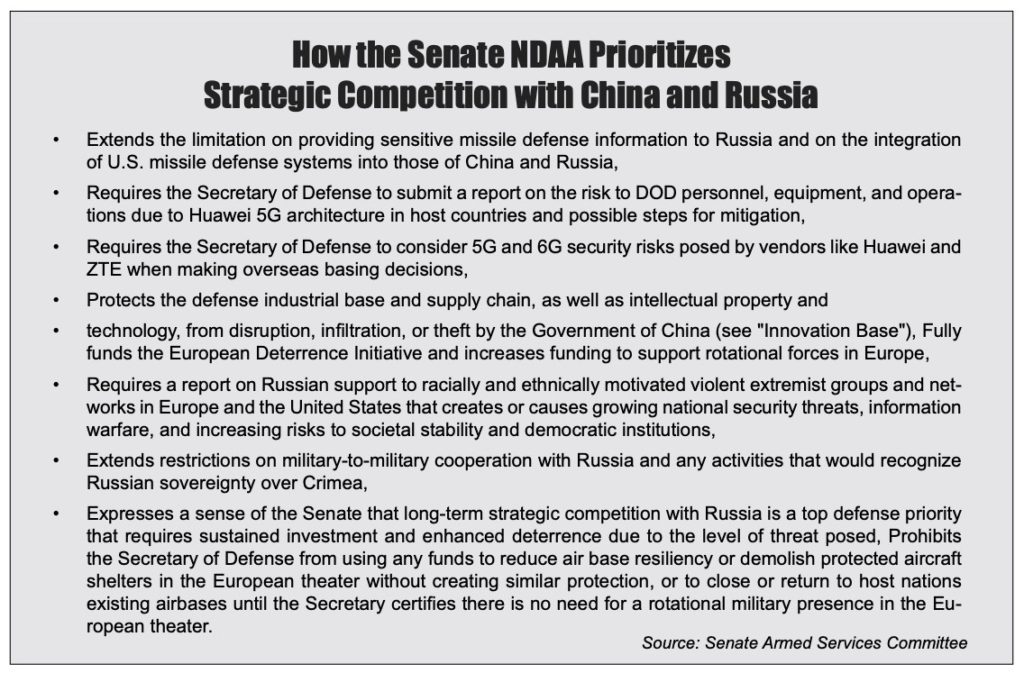Dangerous activity of Russia and China
underscores importance of enacting the NDAA
 At the end of August, Russian soldiers crashed their vehicle into a U.S. military vehicle in Syria, injuring several U.S. service members. A few days later, two Russian fighter jets harassed a U.S. B-52 bomber over the Black Sea, intentionally operating in a provocative and reckless manner.
At the end of August, Russian soldiers crashed their vehicle into a U.S. military vehicle in Syria, injuring several U.S. service members. A few days later, two Russian fighter jets harassed a U.S. B-52 bomber over the Black Sea, intentionally operating in a provocative and reckless manner.
Incidents like these have grown more common in recent years as Russia, under President Vladimir Putin, has set out on a quest to become a global power once more. Since 2012, Moscow has invaded and annexed the Crimean Peninsula, significantly expanded its presence in Syria, where it supports the dictator Bashar al-Assad, and interfered in democratic elections around the world.
China, too, poses a growing threat to the interests of the free world. Just a few weeks ago, they test-fired weapons widely regarded as having been developed specifically to threaten U.S. Navy ships, including “carrier killer” missiles, into the South China Sea, an area that is contested under international law but which Beijing claims as its own. And like Russia’s illegal annexation of Crimea in 2014, China broke their “one country, two systems” promise to Hong Kong earlier this year, and has perpetrated an ongoing campaign of mass incarceration against millions of its Uighur citizens.
The Trump Administration has been more realistic about Chinese and Russian ambitions than its predecessor. It moved swiftly to increase defense spending, and in 2018 it released its National Defense Strategy, which firmly places strategic competition with these two countries at the forefront of the Department of Defense’s planning.
The idea that America, not Russia or China, should play the leading role in world affairs is bipartisan.
This year’s National Defense Authorization Act, the Senate version of which passed 86-14, helps resource the Department to carry this mission out in the face of these growing threats. It also includes the largest troop pay increase in nearly a decade, as well as several provisions that will support our military families through employment opportunities and child care.
I represent Nebraska, the home of U.S. Strategic Command, which is responsible for strategic deterrence, nuclear and space operations, and missile defense, among other things. As the chairman of the Senate Armed Services Subcommittee on Strategic Forces, which oversees STRATCOM’s activities, I am proud that the Senate NDAA also includes funding for many of the command’s top priorities.
The FY 2021 NDAA authorizes funding for one of my highest priorities in the Senate: nuclear modernization. Despite being the bedrock of our national security, much of our nuclear deterrent has been in service since the Cold War. All three legs of our nuclear triad have been extended far beyond their original service lives, and 30% of the facilities at the National Nuclear Security Administration, a semi-autonomous agency within the Department of Energy that oversees the warheads themselves, date to the Manhattan Project and early Cold War era. According to our top military officials, it is simply not possible to keep our oldest weapons in service any longer. As Admiral Charles Richard, the STRATCOM commander, unequivocally testified before Congress earlier this year, the “sustainment and modernization of our nuclear forces has transitioned from something we should do to something that we must do.”
Bringing this deterrent up to date will take many years, and it requires sustained political and budgetary support. The Senate’s bill provides both.
Nebraska is also home to the 55th Wing, a unit of the Air Force that carries out global intelligence, surveillance, and reconnaissance missions. The Air Force has shrunk to a historically small size, and it is critical we invest in its modernization and growth. For this reason, the NDAA includes language I authored to help reach the goals of Air Force We Need, while supporting important new technologies and platforms.
The Senate NDAA does more than any other bill in recent memory to promote U.S. leadership.
This bill also includes support for the State Partnership Program, enabling National Guard units and partner militaries in other countries to train together. One of America’s greatest strengths is our network of allies, who share our values and whose support will be crucial to the free world’s long-term competition with Russia and China. Projects like the State Partnership Program help to strengthen these alliances and even to cultivate new ones.
The idea that America, not Russia or China, should play the leading role in world affairs is bipartisan. The Senate NDAA does more than any other bill in recent memory to promote U.S. leadership, and my Republican and Democratic colleagues in the Senate recognized this and largely voted for its passage.
Congress has passed the NDAA every year for the past 60 years, fulfilling its duty to our military, their families, and our national security. As we approach the end of 2020, the Senate and House of Representatives are preparing to meet in conference to discuss our versions of the bill.
During this process, we cannot lose sight of our greatest geopolitical threats: Russia and China. The future of our country depends on enacting a bill that puts America first and protects our people.
U.S. Senator Deb Fischer is Nebraska’s senior senator and a member of the Senate Armed Services Committee. She serves as the chairman of the Subcommittee on Strategic Forces.





